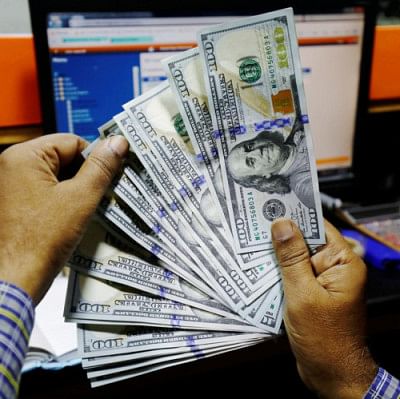Dollar selling spree on despite taka depreciation

Bangladesh Bank's efforts to rein in runaway imports through the depreciation of the taka have hardly brought any impacts as the demand for US dollars has kept soaring to feed the economy rebounding from the coronavirus pandemic.
The central bank injected a record $3.07 billion into banks in the July-January period of the current fiscal year of 2021-22, comfortably breaking the previous high. Alone in January, it sold $559 million, BB data showed.
The previous high was registered in 2018-19 when the BB sold $1.34 billion.
The latest surge in demand for US dollars has led two analysts to call for further weakening of the local currency to discourage imports.
On January 9, the central bank devalued the taka by Tk 0.20, lifting the local currency to Tk 86 per dollar. The USD hovered around the rate until February 3. It was Tk 84.80 on the same day a year ago.
But the devaluation has not been produced major changes when it comes to containing imports. Import payments reached $38.97 billion in the first half of the fiscal year, an increase of 54.5 per cent year-on-year.
"We have to lower our consumption given the excessive increase in imports," said Ahsan H Mansur, executive director of the Policy Research Institute of Bangladesh.
There is room for the central bank to deprecate the local currency further, said Mustafizur Rahman, a distinguished fellow at the Centre for Policy Dialogue (CPD).
Both the government and the central bank should make a concerted effort to cut the import payments in order to keep the foreign currency reserves buoyant.
This is because the reserves declined to $45.13 billion on February 2 after rocketing to $48 billion, an all-time high, in August last year.
Banks have purchased US dollars from the central bank in exchange for the taka, squeezing money circulation in the economy.
The excess reserve of banks, deposited at their current accounts with the BB, went down to Tk 44,141 crore in December in contrast to Tk 32,052 crore the month before.
Such reduction in money circulation helps curb inflationary pressures. But the ongoing global supply chain disruption is mainly responsible for the price increase in Bangladesh.
Mansur sees depreciation of the local currency as a major tool to control imports.
He also thinks that imports of industrial raw materials and capital machinery will not face any roadblock despite the appreciation of the greenback since the two ingredients are mainly used in producing exported items.
The increase in export earnings, which receive a boost in the event of the depreciation of the local currency, will easily offset the higher import payments, said Mansur.
A withdrawal of the 9-per cent lending cap, put in place by the government since April 2020, will also help strengthen the taka, according to Mansur.
If businesses take out loans at higher rates than the current ceiling, the cost of finances will go up. This will also make the local currency stronger.
"The balance of payments will be in trouble if the ongoing situation persists," said Mansur.
The deficit in the current account was $8.18 billion in the first half of the fiscal year in contrast to a surplus of $3.51 billion during the same period a year ago.
Falling remittance is another factor for the inadequate supply of greenbacks in the market. Remitters sent home $11.94 billion in the first seven months to January, down 20 per cent year-on-year.
CPD's Rahman laid emphasis on beefing up the central bank's monitoring to see whether there are any money laundering attempts perpetrated by delinquent persons in the name of higher imports.
Launderers chiefly try to transfer money abroad in the guise of imports of capital machinery and industrial materials, a majority of which usually enjoy zero tariffs when they are brought in, he said.
"Both imported items have maintained an upward trend. The central bank and the National Board of Revenue should keep an eagle eye on the issue," Rahman said.
He called on the government to discourage the import of luxurious items.
"It is difficult to cut imports except those aimed at lavish goods," said Syed Mahbubur Rahman, managing director of Mutual Trust Bank.
"The money market is now facing a bit tighter situation due mainly to the higher import payments."

 For all latest news, follow The Daily Star's Google News channel.
For all latest news, follow The Daily Star's Google News channel. 



Comments